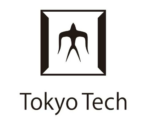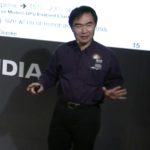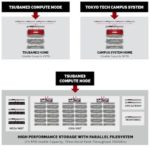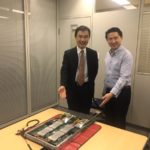TOKYO – May 19, 2023 – Hewlett Packard Enterprise (NYSE: HPE) today announced that it was selected by Tokyo Institute of Technology (Tokyo Tech) Global Scientific Information and Computing Center (GSIC) to build its next-generation supercomputer, TSUBAME4.0, to accelerate AI-driven scientific discovery in medicine, materials science, climate research, and turbulence in urban environments. TSUBAME4.0 will be built using HPE […]
NTT Research and Tokyo Tech Announce Algorithm that Enhances Performance and Scope of Coherent Ising Machine
Sunnyvale, Calif. – December 20, 2022 – NTT Research, Inc., a division of NTT (TYO:9432), today announced that scientists from the NTT Research Physics & Informatics (PHI) Lab and Tokyo Institute of Technology (Tokyo Tech) have presented a new algorithm that combines amplitude control feedback and Zeeman terms to overcome inherent limits of a Coherent Ising Machine (CIM) […]
Satoshi Matsuoka Moves to RIKEN Center for Computational Science
Satoshi Matsuoka from the Tokyo Tech writes that he is taking on a new role at RIKEN to foster the deployment of the Post-K computer. “From April 1st I have become the Director of Riken Center for Computational Science, to lead the K-Computer & Post-K development, and the next gen HPC research. Riken R-CCS Director is my main job, but I also retain my Professorship at Tokyo Tech. and lead my lab there & also lead a group for AIST-Tokyo Tech joint RWBC-OIL.”
Radio Free HPC Gets the Scoop from Dan’s Daughter in Washington, D.C.
In this podcast, the Radio Free HPC team hosts Dan’s daughter Elizabeth. How did Dan get this way? We’re on a mission to find out even as Elizabeth complains of the early onset of Curmudgeon’s Syndrome. After that, we take a look at the Tsubame3.0 supercomputer coming to Tokyo Tech.
DDN and Lustre to Power TSUBAME3.0 Supercomputer
“The IO infrastructure of TSUBAME3.0 combines fast in-node NVMe SSDs and a large, fast, Lustre-based system from DDN. The 15.9PB Lustre* parallel file system, composed of three of DDN’s high-end ES14KX storage appliances, is rated at a peak performance of 150GB/s. The TSUBAME collaboration represents an evolutionary branch of HPC that could well develop into the dominant HPC paradigm at about the time the most advanced supercomputing nations and consortia achieve Exascale computing.”
Pascal GPUs to Accelerate TSUBAME 3.0 Supercomputer at Tokyo Tech
“TSUBAME3.0 is expected to deliver more than two times the performance of its predecessor, TSUBAME2.5,” writes Marc Hamilton from Nvidia. “It will use Pascal-based Tesla P100 GPUs, which are nearly three times as efficient as their predecessors, to reach an expected 12.2 petaflops of double precision performance. That would rank it among the world’s 10 fastest systems according to the latest TOP500 list, released in November. TSUBAME3.0 will excel in AI computation, expected to deliver more than 47 PFLOPS of AI horsepower. When operated concurrently with TSUBAME2.5, it is expected to deliver 64.3 PFLOPS, making it Japan’s highest performing AI supercomputer.”









